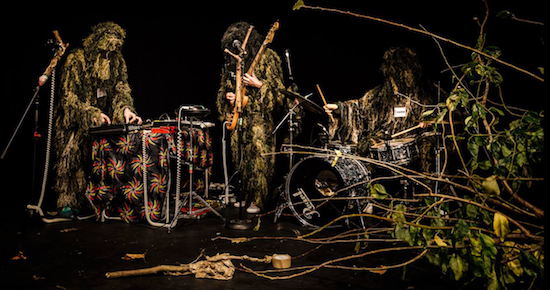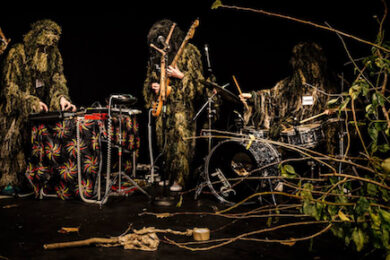In trying times, resistance and resilience are born from the undergrowth of artistic communities. Across the UK though, a worrying number of the small venues and spaces where these communities have formed and flourished for years are being forced to shut their doors, threatening to leave us with only the sound of gentrification’s synthetic drips. When we live in cities and towns where grassroots arts collectives are being evicted and ostracised by the powers that be, often to be replaced by copy and paste coffee shops and ‘quirky’ porridge stalls or whatever-the-fuck, it becomes all the more vital to embrace unique, strange and creative movements wherever they persevere.
To observe the ecology of these communities and the landscape in which they grow is to observe something natural and wild. Something gnarled and cobbled together and something rather beautiful. There are few finer examples of this than London-based woodland creatures Snapped Ankles. They formed in 2011, and have evolved their motorik post-punk sound and shrubby ‘non-aesthetic’ through years of playing warehouse parties and live soundtracking visual installations and films. Through all this, they’ve joined the ranks of the many great acts to form out of Stoke Newington’s Total Refreshment Centre.
On their debut LP for The Leaf Label, Come Play The Trees , this outfit of anonymous hedge-folk have taken their DIY determination, obsession with film and observational lyricism and put together a collection that is devilishly playful, suitably daft and absolutely belting. In doing so, they speak to the kinetic communities that, in the face of being wheedled out or shut down, may still rise to be the most inventive, vibrant and diverse parts of any city. Come Play The Trees is both an analysis and an invitation. It’s the embodiment of the weird, wonderful and true ecology of it all, presented by a bunch of folks dressed like ditches.
Sonically, Come Play The Trees is propulsive and angular, veering from the crunching bass and clamorous drums of ‘Hanging With The Moon’ and ‘I Want My Minutes Back’ to the triumphal synth arpeggios and fuzzed out guitars of ‘Jonny Guitar Calling Gosta Berlin’, all the while maintaining a singular character. Loaded with a motorik drive and post-punk dirt, every track manages to maintain a natural air despite itself, each like a rusty metallic sculpture of something organic. It helps to know that the DIY experimental vigour of the group has seen them build their own equipment over the years, the most notable and regular appearances being from their homemade log synths. Made from circuits wired into pieces of wood, the synths create sizzling, frenetic buzzes and bleeps that are at once electric and raw, giving the air of a pagan Can or a forested Fall.
The band’s collective love for all things cinema lends to the vivid imagery that the sounds conjure: of dark woods doused in intense strobe, of branches bursting from a concrete wall, of abandoned industrial buildings overcome by vines and moss. Of course, some of the cinematic images are more obvious than that, such as on ‘Jonny Guitar Calling Gosta Berlin’, which references Jean Luc-Godard’s Weekend – a film the band describe as Godard’s "punky rant against the bourgeois and the middle classes who were running amok".
‘Jonny Guitar’ is part of the album’s double-decker centrepiece, alongside ‘Let’s Revel’, a track that starts with a low, growling drone and fizzy synth bursts. A slow, hypnotic percussive pattern gives backbone to lyrics that paint a familiar picture for anyone struggling to survive as an artist in this socio-economic climate: “It’s getting harder to be in control / It’s getting harder to be on a roll / It’s getting harder to be on the dole.”
The song erupts into the album’s most brutal climax, with a frenzy of wiry keys and distorted bass and guitar. Frantic, yappy vocals embrace the hedonism and revelry into which we escape, where we unravel in the joy and chaos and fun and pain that simultaneously fuels and knocks us. “Let’s revel in alcohol,” they sing. “Let’s revel in building control / Let’s revel in dense misery / Let’s revel in new chemistry / Let’s revel in former glory.”
After the towering heights of those massive cuts, the album deflates a little too clumsily into ‘Tuesday Makes Me Cry’ and ‘The Invisible Real That Hurts’. The former, an industrial, pulsing beast, would have sat more comfortably the first half. The latter, the album’s weakest, is a bit too much of a clunky LCD Soundsystem-meets-Talking Heads ode to fit the LP’s mould. But the second half is saved by a revamped version of one of Snapped Ankles earliest singles, ‘True Ecology’, a sharp disco-punk onslaught with enough grit in its rakish pop chorus to keep you coming back over and over again.
There is mischief at nearly every turn in Come Play The Trees. In its prickliest, most colourful corners you find the same ‘right-on’ notions that Arcade Fire tried and failed to convey in the cynical implosion of self-righteous mud that was Everything Now. Arcade Fire’s commentary on some vague authority came off looking like an undercover cop trying to wield a joint. Snapped Ankles have achieved this seamlessly, likely by complete accident, and without even a hint of bullshit.
This album represents the outlandish innovation and fun that defines so many of the UK’s independent arts and music collectives, and does so with a smile on its face and a sharp wooden tongue driven firmly into its cheek. Snapped Ankles, and many more like them, whether they would care to admit it or not, stand for that which enriches the blood of our wonky creative corners. Long may the likes of them clatter.




